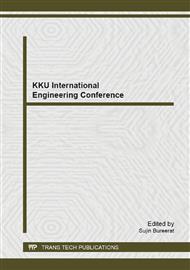p.386
p.392
p.397
p.403
p.411
p.416
p.421
p.426
p.431
The Carbonation of Calcium-Silicate-Hydrate C-S-H in Cement Mortar Studied Using Thermal Analysis and Gas Pycnometer: Determination of the Quantity of Calcium Carbonate Produced and the Increase in Molar Volume
Abstract:
The objective of this work was to examine the microstructural changes caused by the carbonation of normalised cement mortar. Samples were prepared and subjected to accelerated carbonation at 20°C, 65% relative humidity and 20% CO2 concentration. The main contributions of this study were: 1) a new way to determine separately the amount of calcium carbonate CaCO3 produced by the carbonation of portlandite Ca (OH)2 and that associated with the carbonation of calcium-silicate-hydrate C-S-H using only thermal analysis; 2) determination of the increase in the molar volume of the calcium-silicate-hydrate C-S-H due to carbonation using gas pycnometer, which indicated an increase of about 39 cm3 for 1 mole of C3S2H3 carbonated. The results indicated that the amount of CaCO3 produced by the carbonation of C-S-H is higher than that produced by the carbonation of portlandite.
Info:
Periodical:
Pages:
411-415
Citation:
Online since:
May 2014
Authors:
Price:
Сopyright:
© 2014 Trans Tech Publications Ltd. All Rights Reserved
Share:
Citation:


